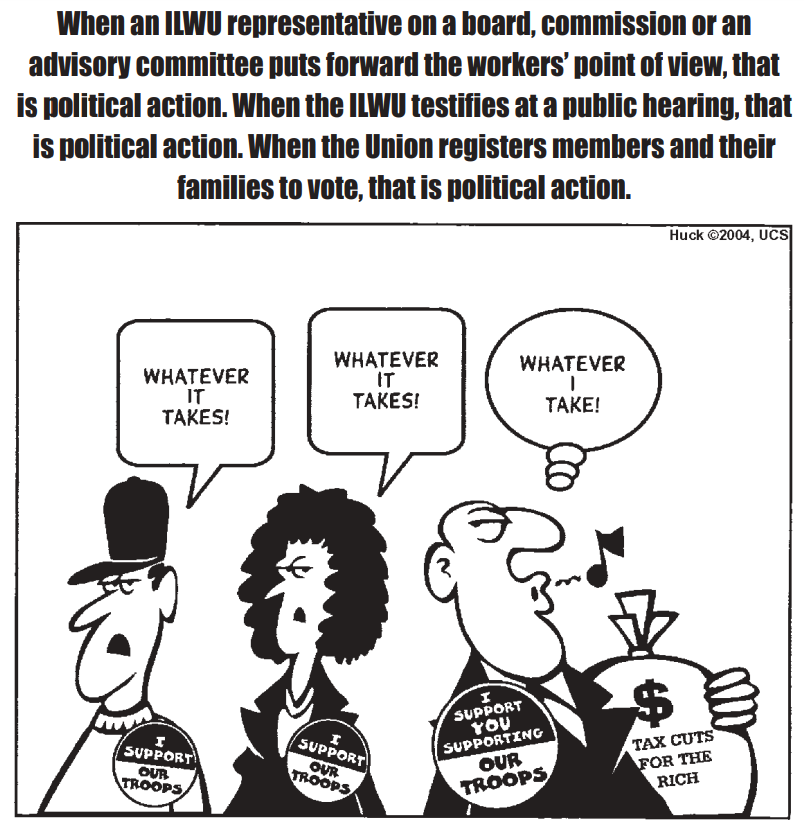The ILWU Local 142 faced a tremendous job in the 2002 elections. The Governor and Lt. Governor seats were being vacated, there were mayoral races on Kauai and Maui, all of the Senate seats were up for election, and the death of our good friend, Congresswoman Patsy T. Mink, resulted in two special elections.
The ILWU in full cooperation with other unions and the Hawaii State AFL-CIO, with assistance from the national AFL-CIO, launched a massive campaign to turn the tide. Our main focus was union members talking to other union members and family. Also, there was major independent political advertising and direct mail to union households.
These efforts were effective but, unfortunately, not enough to win the Gubernatorial race and Mayoral races on Maui and of Kauai. However, while the Republicans increased their numbers in the Senate by two (from three to five), in the House of Representatives the Republicans lost a net four seats (from nineteen to fifteen). This significantly put the Democrats in firmer control of the House of Representatives and reflected the grassroots effectiveness of the ILWU strategy.
The challenge for the upcoming elections in 2004 and 2006 is how to implement our program more effectively. Will we register more members and their families to vote, especially in large enough numbers to make a difference in more races? Will we communicate with more union households in more precincts and in more House districts so that they support the Unions program? Will we be able to get our members and their families out to vote? The Republicans have taken not only a page, but pages, out of labor’s book on effective political action. We must take up the challenge and continue to make a difference for our members, their families and all of Hawaii’s people.
Year-Round Political Action
Political action is a year-round activity. When an ILWU representative on a board, commission or an advisory committee puts forward the workers’ point of view, that is political action. When the ILWU testifies at a public hearing, that is political action. When the Union registers members and their families to vote, that is political action.

Our Political Action Program impacts all other areas of the Union’s work. The importance of the ILWU’s Political Action Program cannot be over-stressed. The Union has made its historical mark on Hawaii’s labor and social legislation. It is our responsibility to continue to move this program forward—if not for us, then for the future of Hawaii and the well-being of our children.
Statement of Policy on Political Action
In the same way as it uses economic strength to win economic objectives, the ILWU uses its political strength and independent bargaining power to win beneficial legislative objectives for its members, for all workers, and for our communities. Unity and membership support are essential for success in either field.
The Convention reaffirmed the policy that all Union Officials, including unit officers and stewards, must follow the Union’s political program and must use the Union’s Political Action machinery. Individual union members are encouraged to support the Union’s political action program.
The Convention also reaffirmed policy adopted by the Local Political Action Committee to: (1) require that the Local PAC approve endorsements for all mayor’s races, and (2) include one pensioner representative from each Division to sit on the Local PAC with voice but no vote.
The Convention amended PAC2 by adopting RPAC-1, which adds a representative from each ILWU pension club to the Division Political Action Committee with voice and vote.
Memorial Association
The ILWU Memorial Association is a 501(c)5 labor organization separate from ILWU Local 142. However, the M.A.’s corporate purposes clearly state that the M.A. is organized to promote the efforts of the Local and to improve the lives of ILWU members. Current M.A. board members are: John Arisumi, president; Yoshito Takamine, vice president; Fred Lee, secretary; Alfred Castillo, assistant secretary; Shoji Okazaki, treasurer; Antone Kahawaiolaa, Jr., assistant treasurer; and Akira Omonaka, Eusebio Lapenia, Jr., and Robert Girald, directors.
Real property assets
The M.A. owns six buildings occupied by the Local, located in Honolulu, Wailuku, Lihue, Molokai, Hilo, Honokaa, and Lanai. The Local currently pays $600,000 in lease rent for all buildings owned by the M.A. statewide. Since the completion of renovations for the Honolulu headquarters, the M.A. is currently unable to consider new property acquisition or major renovations of existing buildings. However, these projects may be considered as funds are accumulated. Repair and maintenance of all buildings owned by the M.A. will be ongoing.
Restoration work on the ILWU mural by Pablo O’Higgins was completed in 2001 by four conservators commissioned by the Mexican government to preserve and protect this historic treasure. The mural now looks new and can survive another 50 years. To protect the mural, the adjacent curved stairway has been closed to traffic.
Pensioner program
Twenty-two pensioner clubs are the backbone of the ILWU pensioner program. Through the clubs, the union is able to communicate with pensioners about union activities, political action, and other issues. In turn, clubs have assisted to bring out pensioners to support ILWU programs.
A pensioner conference is held every two years to allow pensioners to interact with one another and build solidarity as a group. Last year’s conference in Honolulu was attended by more than 100 and the same number is expected at next year’s conference on Maui.
Political action and organizing
The ILWU Memorial Association and the pensioners will continue to support the ILWU political action program and any organizing efforts by the Local.
Staff support
Staff support is provided by Local 142 staff, including: Desmond Kochi, Local Office Manager, for physical plant issues, and Joanne Kealoha, Local Services Coordinator, for programs.
